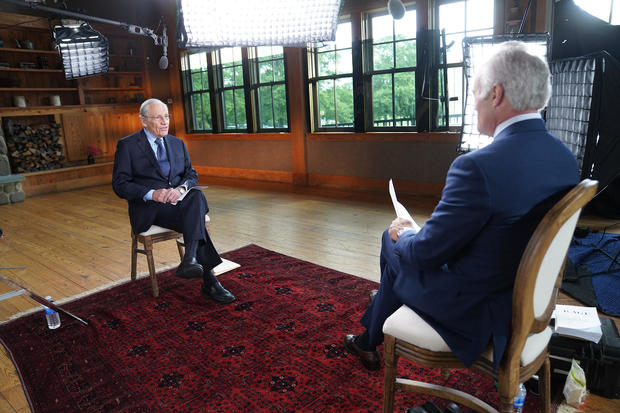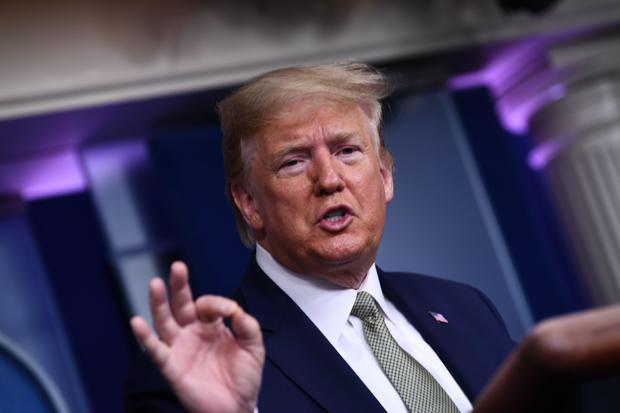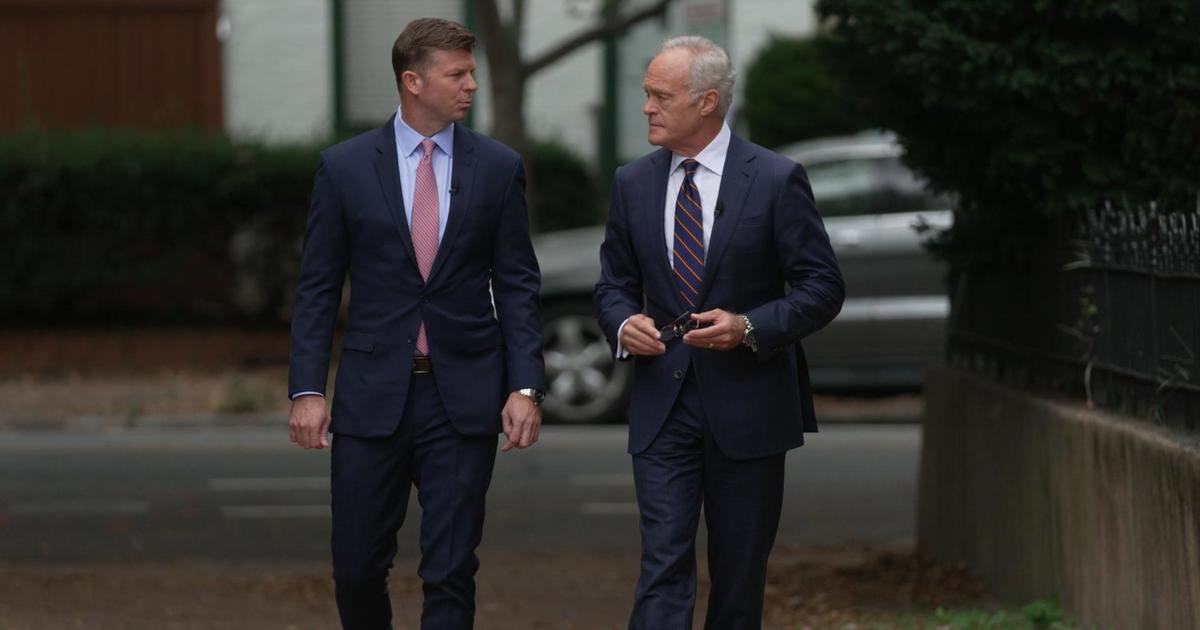Donald Trump's conversations with Bob Woodward about coronavirus, Black Lives Matter and nuclear war
Tonight, new reporting from the Washington Post's Bob Woodward says that President Trump was bluntly warned in January about the threat of coronavirus but chose to downplay the danger in public. Woodward's new book, "Rage," is his latest work in a 50-year career investigating American presidents. His first investigation, reported with Carl Bernstein, led to the resignation of Richard Nixon. For "Rage," Mr. Trump agreed to 18 recorded interviews. Many, which you're about to hear, started with the words of the White House operator, "Mr. Woodward? The president." Mr. Trump called, sometimes late at night, to talk about 'Black Lives Matter,' the threat of nuclear war, and about the dire warning he received during an intelligence briefing this past January.
Bob Woodward: On January 28th of this year, before the virus was on anyone's radar, the national security advisor, Robert O'Brien, told the president, "This virus will be the biggest national security threat you face in your presidency."
Scott Pelley: What was the president's reaction?
Bob Woodward: His head popped up and he asked questions.
President Trump's questions, in the January 28 meeting, exposed a difference of opinion. Beth Sanner, from the Office of the Director of National Intelligence, said the virus might be no worse than SARS in 2003, when there were only eight known infections in the U.S.. But, Woodward says, Deputy National Security Advisor Matt Pottinger, who had been a reporter in China, told Mr. Trump his unofficial Chinese contacts had raised a grave warning.
Bob Woodward: Pottinger said his contacts in China told him "This is going to be like the 1918 Spanish flu pandemic that killed 675,000 people in this country." It was a stunning moment in the Trump presidency and, I think, in American history. Because he then went on to publicly dismiss the virus. And he knew that this was a pandemic coming.
Scott Pelley: And this is January 28th?
Bob Woodward: Yes.
The next day, the White House announced a coronavirus task force. This was Mr. Trump, January 30, two days after the warning.
President Trump during January 30 public speech: We think we have it very well under control. We have very little problem in this country at this moment — five. And those people are all recuperating successfully. But we're working very closely with China and other countries, and we think it's going to have a very good ending for us. So that I can assure you.
Chinese officials were concealing what they knew about COVID-19.
On January 31, the president restricted travel from China. The next week, in a phone call, Mr. Trump told Woodward what he'd been learning about the virus. This was February 7.
President Trump during February 7 phone call with Bob Woodward: It goes through air, Bob. That's always tougher than the touch. You know, the touch, you don't have to touch things. Right? But the air, you just breathe the air and that's how it's passed.
And so that's a very tricky one. That's a very delicate one. It's also more deadly than your, you know, your even your strenuous flus. This is deadly stuff.
Three weeks after that call, the president said this to the public.
President Trump during February 26 White House press conference: It's a little like the regular flu that we have flu shots for. And we'll essentially have a flu shot for this in a fairly quick manner. Yeah, go ahead...
Scott Pelley: In that February 7th interview, it's clear that the president knows what the stakes are. But he's not sharing that with the public at that time.
Bob Woodward: Yes. This is the tragedy. the president of the United States has a duty to warn. The public will understand that. But if they get the feeling that they're not getting the truth, then you're going down the path of deceit and cover up.
Scott Pelley: Did the president ever disclose to you why he wasn't telling the public what the stakes were with the coronavirus?
Bob Woodward: So in March, I asked exactly that question. You know, what's going on. And the president said:
President Trump during March 19 phone call with Bob Woodward: Well, I think Bob really to be honest with you–
Bob Woodward: Sure, I want you to be.
President Trump: –I wanted to, I wanted to always play it down, I still like playing it down–
President Trump: –because I don't want to create a panic.
Bob Woodward: I think he did not understand the American public. And he said, "Well, I don't wanna create a panic." We know, from history, when the public is told the truth, they organize. "We have a problem. We're going to step up." And Trump thought, "Oh, well, they'll panic." When there's a crisis, when the president, particularly, knows something, it's time to tell the public in some form. He failed.
Scott Pelley: You write, in the book, that, "The president's handling of the virus reflects his instincts, habits, and style." What are those?
Bob Woodward: Denial. Making up his own facts.
At age 77, Bob Woodward has fact-checked nine presidents. "Rage" is his 20th book. It's published by Simon and Schuster, part of ViacomCBS.
Bob Woodward: The title, "Rage," comes from him. He said he brings out rage in people. And he doesn't know whether that's a positive or a negative or a good thing or a bad thing. And also, it describes a condition in the country now. There's a lot of rage out there.
His interviews for "Rage" started in the Oval Office, then continued for months in phone calls, many 'out of the blue' from Mr. Trump.
Bob Woodward: Yes. I mean, you have an audiotape of this, where they come on. "Mr. Woodward, the president."
White House Operator during February 7 phone call with Bob Woddward: Mr. Woodward, the President.
President Trump: Hi Bob.
Bob Woodward: President Trump, how are you?
President Trump: Hi. How are you?
Bob Woodward: …I'm turning my recorder on here as I always do.
President Trump: Okay.
Bob Woodward: It started in December 2019, before the virus was on anyone's radar. So, we were talking a lot about North Korea.
In Mr. Trump's first year, North Korea tested its first intercontinental missile. Woodward says the president gave Defense Secretary James Mattis authority to shoot down any North Korean missile aimed at the United States. North Korea dominated their earliest interviews
Bob Woodward: I think the public did not realize, and Trump told me, repeatedly. He said, "You don't know how close we were to war."
Instead, North Korean Dictator Kim Jong Un offered to meet. They did, three times. Woodward has more than two dozen letters exchanged in their diplomatic courtship.
Bob Woodward: Kim says to Trump, "Our meetings, our relationship, is out of a fantasy film." He says, "There is a magical force between us." "Even now, I cannot forget that moment of history, when I firmly held your Excellency's hand as the whole world watched."
Scott Pelley: Did the CIA have a look at Kim's letters?
Bob Woodward: Yes.
Scott Pelley: And what did they make of them?
Bob Woodward: They never figured out who was writing them. But the analysts concluded that they're masterpieces. Because they are appealing to Trump's sense of grandiosity.
Woodward's interviews took a sharp turn, May 25, after George Floyd was killed by Minneapolis Police Officers. The Black Lives Matter movement reignited.
President Trump during June 22 phone call with Bob Woodward: I got it.
Bob Woodward:: Do you think there is systematic or institutional racism in this country?
President Trump: Well, I think there is everywhere, I think probably less here than most places, or less here than many places.
Bob Woodward:: Okay, but is it here, in a way that it has an impact on people's lives?
President Trump: I think it is and it's unfortunate. But I think it is.
Woodward asked Mr. Trump if a privileged life left him out of touch.
Bob Woodward during June 19 phone call with President Trump: …And do you have any sense that that privilege has isolated and put you in a cave, to a certain extent, as it put me – and I think lots of White, privileged people – in a cave and that we have to work our way out of it to understand the anger and the pain, particularly, Black people feel in this country? Do you see?
President Trump: No. You, you really drank the Kool-Aid, didn't you? Just listen to you, wow. No, I don't feel that at all.
Bob Woodward: He was ridiculing me for reflecting what the whole movement, after George Floyd, is.
By the time of their final interviews, in August, Mr. Trump had become the leader of the one nation suffering the most from the virus. The president came to this conclusion.
Bob Woodward during August 14 phone call with President Trump: You and I--
President Trump: --Nothing more could have been done. Nothing more could have been done.
Bob Woodward: "Nothing more could have been done. Does he remember what he told me, back in February, about, it's more deadly than the flu? I mean it almost took my breath away, that there was such certainty, when he was absolutely wrong about the issue that defines the position of this country right now.
This past week, the Washington Post published Woodward's calls with the president, and Woodward was criticized for not reporting, back in February, what Mr. Trump had said about the virus being deadly. Woodward says he didn't know at the time whether Mr. Trump was right. In our interview, we asked about another controversy—contained in the last line of the book.
Scott Pelley: It might disappoint some of your fans that you reach an editorial conclusion at the end of this book, something that reporters are not supposed to do.
Bob Woodward: Yes. I say the president is the wrong man for the job.
Scott Pelley: But, you're known as the reporter who doesn't put his thumb on the scale. And yet, at the end of this book, you do just that.
Bob Woodward: it's a conclusion based on evidence, overwhelming evidence, that he could not rise to the occasion with the virus and tell the truth. And one of the things that President Trump told me, "In the presidency, there's always dynamite behind the door." "The real dynamite is President Trump. He is the dynamite."
The president's final call came too late. He asked Woodward to include the August peace agreement between Israel and the United Arab Emirates, but "Rage" was already off to the press. Woodward took the opportunity to level with the president.
Bob Woodward: And I said, "It's a tough book. There are going to be things that you are not gonna like, judgments that I made." And he, at the end, said, "Well, I didn't get you on this book. Maybe I'll get you on the next one."
President Trump during August 14 phone call with Bob Woodward: …but it looks like I don't have it on this book, but we'll get you sometime later, I guess.
Bob Woodward: It's tough, sir. Thank you very much.
Scott Pelley: And after you told the president that it was, in your words, a tough book, what did he do?
Bob Woodward: An hour and a half later, he tweeted out that the Bob Woodward book is gonna be fake.
Produced by Aaron Weisz. Associate producer, Ian Flickinger. Edited by Warren Lustig.






